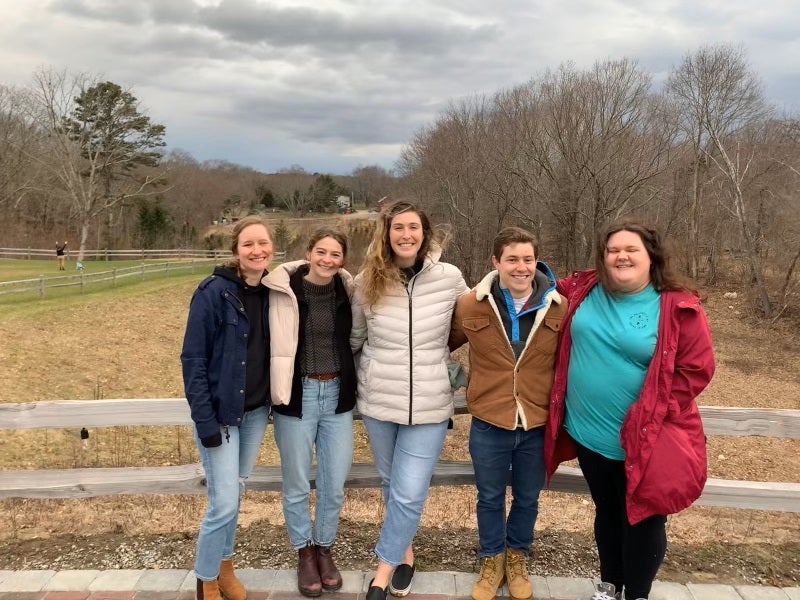Five Master of Arts in Marine Affairs (MAMA) students are preparing to defend their theses on aquaculture, offshore wind, recreational angling, and fisheries management. Check out what they’ve been working on!
Callan Yanoff
Title: Opinions on the Halfshell: Examining Public Perceptions of Southern New England Aquaculture Development
Advisor: Dr. Tracey Dalton
Description: With the recent expansion of aquaculture in New England, it has become increasingly difficult for aquaculture growers with farm proposals to advance past the permitting process due to public opposition. The substantial lack of innovative strategies for understanding and addressing the public’s perceptions of aquaculture development in the Northeast has created conflict in expanding sustainable farming. Through 15 focus group discussions during the summer of 2021, Callan was able to assess how people who live in Rhode Island and Massachusetts think about farm design and examine their attitudes towards aquaculture impacts and governance. She hopes that her research will improve the understanding of public interests and concerns regarding farm design and operations, and offers strategies for coastal management organizations, public policy makers, aquaculture growers, and researchers.
Clay Starr
Title: The Role of Federalism in Initiating Offshore Wind Development in the United States and Europe
Advisor: Dr. Elizabeth Mendenhall
Description: For the United States, offshore wind represents a significant opportunity to meet renewable energy goals, contribute to climate change mitigation, and pursue economic development. Yet despite having abundant wind resources, the United States lags behind most countries with active offshore wind industries in terms of total installed capacity. Clay’s thesis attempted to explain this discrepancy by drawing on the political theory of federalism and through key informant interviews with 22 offshore wind policy experts. His work shows how decentralized governance at the federal level, a lack of leadership, and competition among U.S. states have together impeded efficient and equitable development of offshore wind in the United States relative to Europe. Overall, Clay hopes his work can provide insight into the ways existing political institutions are re-organizing around climate change, or not.
Elizabeth Conley
Title: Angler’s Sense of Place as an Indicator for Perceptions of Vulnerability and Life Satisfaction Relative to Shifting Stock Distributions
Advisor: Dr. Emily Diamond
Description: Geographic locations are a fundamental aspect to human life, but their impact on well-being is seldom accounted for and often not formally considered within assessment frameworks to monitor at-risk coastal communities. Climate change continues to warm ocean waters and cause fish stocks to redistribute to untraditional locations, causing changes in angler behavior and destabilizing the connection they have built with particular places in order to fish successfully. Elizabeth’s research evaluates recreational angler’s sense of place as an indicator to assess perceptions of vulnerability and life satisfaction in relation to shifting fish stock distributions through a mixed-methods research design. She hopes her findings may contribute to the robustness of the socio-cultural data collected within fishing communities to build holistic and adaptive ecosystem-based management plans, as well as assist with the movement towards climate-ready fisheries policy.
Katie Urbanski
Title: Taking Stock: Assessing Rhode Island Recreational Angler Conservation Ethic and Coastal Identity
Advisor: Dr. Emily Diamond
Description: Fisheries management in the United States is widely lauded for its effectiveness at maintaining healthy stock sizes and for actively rebuilding overfished stocks. Managing recreational fishers in particular, especially within the growing ecosystem-based fisheries management movement, relies heavily on assumptions of compliance with regulations. As such, it is crucial to understand whether ethical fishing attitudes and behaviors exist among fishers in practice. Katie’s research used a mixed methods approach to assess Rhode Island recreational anglers’ conservation ethic, perceptions of fishing impact, and fishing behaviors, and examined the links between these components and anglers’ coastal identities. She uses the findings of this research to make recommendations to fisheries managers and policy communicators that include appealing to this highly salient identity in order to continue encouraging strong fisher ethic and behavior.
Mary Carper
Title: Diving In: Learning Best Practices from Belize’s Managed Access Program Fisheries Policy
Advisor: Dr. Melva Treviño Peña
Description: The country of Belize in Central America has recently moved from an open access fisheries management regime to the Managed Access Program (MAP), based on the Territorial Uses Rights in Fisheries (TURFs) approach, as of 2016 after a pilot launch in 2011. Fishing communities are dependent on fish stocks for a variety of reasons and as such it is important to understand how a community responds to changes in fisheries management policies. Therefore, Mary’s research used secondary data in the form of archive and census documents along with key informant interviews to gain an understanding of social and economic impacts from Belize’s Managed Access Program. Using content analysis she was able to form a holistic narrative of Belize’s journey from before the MAP to after its national implementation. From this information she was able to provide a unique perspective towards recommendations for increasing socioeconomic efficiency for fishing communities.

